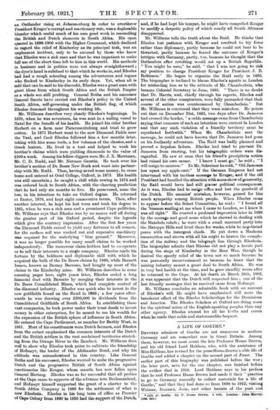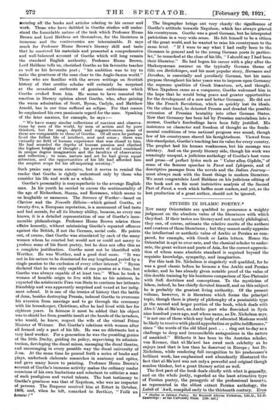A LIFE OF GOETHE.*
DEVOTED admirers of Goethe are not numerous in modern Germany and are somewhat rare in Great Britain. Among them, however, we must count the late Professor Hume Brown, and his old friend Lord Haldane, who, with the assistance of Miss Haldane, has revised for the press Hume Brown's able life of Goethe and added a chapter on the second part of Faust. The earlier part of this biography was published before the war ; the later part, save for the one chapter, was finished before the author died in 1918. Lord Haldane says in his preface that he and Professor Hume Brown had made it their " practice to go to Germany annually to collect materials for a life of Goethe," and that they had done so from 1898 to 1912, visiting Weimar, Ilmenau, Jena, and other haunts of the poet and • 14/4 of Goethe. By P. Hume Brown. 2 vols. London: on Murray. not.]
securing all the 'books and articles relating to his career and work. Those who have dabbled in Goethe studies will under- stand the formidable nature of the task which Professor Hume Brown and Lord Haldane set themselves, for the literature is immense and the controversies are interminable. It says much for Professor Hume Brown's literary skill and taste that he mastered his materials and presented a comprehensive and well-balanced account of Goethe which will long remain the standard English authority. Professor Hume Brown, Lord Haldane tells us, cherished Goethe as his favourite teacher as well as his favourite poet ; " his ambition was to try to make the greatness of the man clear to the Anglo-Saxon world." Those who are familiar with the severe writings on Scottish history of that erudite scholar will certainly be surprised at the occasional outbursts of genuine enthusiasm which Goethe evoked from him. He seems to have resented the reaction in literary opinion about Goethe, who, after gaining the warm admiration of Scott, Byron, Carlyle, and Matthew Arnold, has in our time suffered an eclipse. For that reason he emphasized his own passionate regard for the man. Speaking of the later maxims, for example, he says :—
" We have many similar collections of maxims and observa- tions by men of the world, by men of action and by pure thinkers, but for range, depth and suggestiveness, none of these are comparable to those of-Goethe. Of all men he perhaps lived the fullest life of intellect, soul and sense ; there was virtually no field of human experience that was closed to him. He had sounded the depths of human passion and climbed the highest heights of thought ; his powers of mind combined in unique degree imagination and the faculties of observation and reflection ; to man, nature and art he had given equal attention, and the opportunities of his life had afforded him the amplest scope for his all-inquiring scrutiny."
Such praise may seem excessive, but it serves to remind the reader that Goethe is rightly understood only by those who consider his life and work as a whole.
Goethe's personality is unsympathetic to the average English- man. In his youth he carried to excess the sentimentality of the age of Richardson, Sterne, and Rousseau, which seems to us laughable or nauseous. The Sorrows of Werther—based on Clarissa and the. Nouvelle Haoise—which gained Goethe, at twenty-five, a European reputation, is a monument of bad taste and bad morals, for all its literary ability, because, as every one knows, it is a detailed representation of one of Goethe's innu- merable philanderings. Professor Hume Brown relates these affairs honestly, without minimizing Goethe's repeated offences against the British, if not the German, social code. He points out, of course, that Goethe was stimulated by each of the many women whom he courted but would not or could not marry to produce some of his finest poetry, but he does not offer this as a complete justification. Goethe must not be identified with Werther. He was Werther, and a good deal more. " It was not in his nature to be dominated for any lengthened period by a single passion to the exclusion of every other interest." " Byron declared that he was only capable of one passion at a time, but Goethe was always capable of at least two." When he took a woman of humble origin to live with him as his mistress, he expected the aristocratic Frau von Stein to continue her intimate friendship and was apparently surprised and vexed at her indig- nant refusaL It is one of the ironies of history that the battle of Jena, besides destroying Prussia, induced Goethe to overcome his aversion from marriage and to go through the ceremony with his housekeeper, Christiane, after he had lived with her for eighteen years. In fairness it must be added that his object was to shield her from possible insult at the hands of the invaders, who would, he knew, respect the wife of the virtual Prime Minister of Weimar. But Goethe's relations with women after all formed only a part of his life. He was no dilettante but a very hard worker. For a generation he was the presiding genius of the little Duchy, guiding its policy, supervising its adminis- tration, developing the ducal mines, managing the ducal theatre, and encouraging in every possible way the ducal university of Jena. At the same time he poured forth a series of books and plays, undertook elaborate researches in anatomy and optics, and gave many hours to painting. Professor Hume Brown's account of Goethe's immense activity makes the ordinary reader conscious of his own limitations and reluctant to criticize a man of such prodigious and varied talents. The best testimony to Goethe's greatness was that of Napoleon, who was no respecter
of persons. The Emperor received him at Erfurt in October, 1808, and, when he left, remarked to Berthicr, " Voila un homme I " The biographer brings out very clearly the significance of Goethe's attitude towards Napoleon, which has always grieved his countrymen. Goethe was a good German, but he interpreted patriotism in a very •wide sense. He felt himself to be a citizen of the great world, and he wanted to raise his countrymen to the same level. " If I were to say what I had really been to the Germans in general and to the young German poets in particu- lar," he remarked at the close of his life, " I should say I had been their liberator." He had begun his career with a play after the Shakespearean manner on the typically German theme of Glitz von Berlichingen, and his most popular story,. Hermann and Dorothea, is essentially and peculiarly German, but his main purpose throughout his later years was to impress upon Germany the supreme qualities of Greek literature, art, and thought. When Napoleon came as a conqueror, Goethe welcomed him in the hope that he would bring peace and greater opportunities for the development of a new and better Germany. He did not like the French Revolution, which so quickly lost its ideals. On the other hand, he detested Prussia and dreaded the possible extension of Prussian brutality into other German States. Now that Germany has been led by Prussian materialism into a morass, Goethe's forebodings have been fully justified. His insistence on character and freedom of thought as the funda- mental conditions of true national progress was sound, though few of his countrymen shared his farsightedness. Viewed from this standpoint, Goethe's teaching has its value for every country. The prophet had his human weaknesses, but his message was salutary. And on the purely literary side, though his work was amazingly unequal, a judicious anthology of Goethe's best verse and prose—of perfect lyrics such as " Ueber alien Gipfeln," of some of the famous speeches in Faust and Iphigenie, and of descriptive passages from the novels and the Italian Journey—. must always rank with the finest things in modern literature. We must congratulate Lord Haldane on his judicious editing of the book and on his most instructive analysis of the Second Part of Faust, a work which baffles most readers, and yet, as the last production of a great author, should not be ignored.



































 Previous page
Previous page